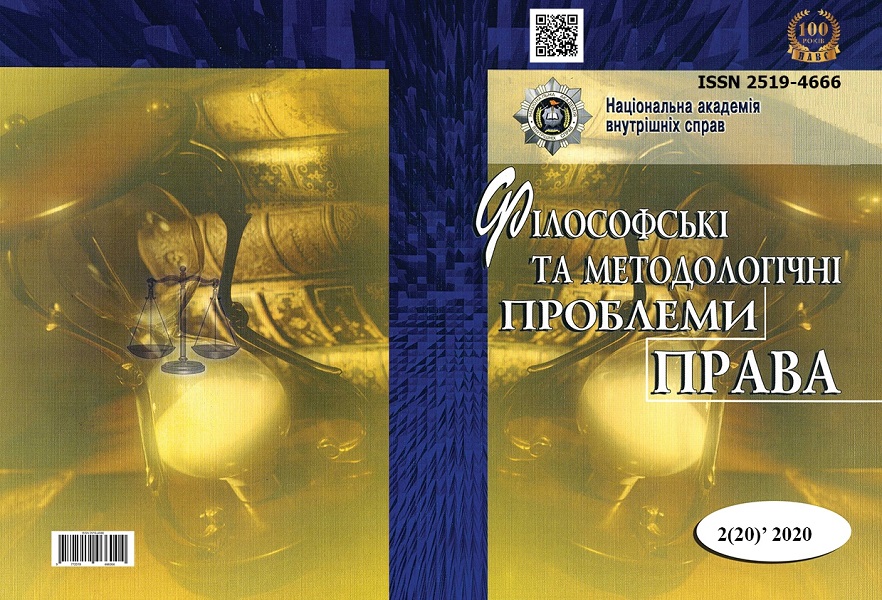Axiological Understanding of Personal Non-Property Rights of an Individual
Abstract
In the article, based on the achievements of representatives of various branches of legal science, the substantive essence of personal non-property rights as a multidimensional legal phenomenon is revealed through the value-semantic sphere of personality. The purpose of the article is to carry out a philosophical and legal analysis of personal non-property rights through the disclosure of their axiological content. Its achievement will be facilitated by: outlining the features of the European doctrine of personal non-property rights, which is the basis of European human rights standards; study of the axiological nature of personal non-property rights; analysis of legal values enshrined in civil law to ensure the rights of which are personal intangible assets. The methodological basis of the study are historical, anthropocentric, formal-legal, dialectical, existential and phenomenological approaches, which together allow to reveal the value of personal non-property rights, to determine the impact of internal values on the possibility of exercising and protecting personal property rights. Scientific novelty. The article examines the value aspects of personal non-property rights of individuals. Conclusions. Personal inalienable rights are an integral element of legal reality, a phenomenon that is important for the development of legal relations that exist in the legal space. Recognition at the level of the Constitution of Ukraine of man as the highest social value, legislative provision of a wide range of personal inalienable rights that may belong to man, recognition of their inexhaustibility is evidence of a qualitative change in the value orientation of our society based on modern European doctrine. At the same time, she can fully realize the personal inalienable rights belonging to a person only by realizing their value, and this can be achieved by having a psycho-emotional and intellectual health, a high level of legal awareness.
Keywords: intangible property; value; object; personal non-property rights; legal awareness; man; life;
freedom; society.
Downloads
References
Братасюк М. Г. Філософія захисту прав людини з позицій сучасного правового мислення. Право України. 2020. № 1 (19). С. 14–20. doi: https://doi.org/10.33270/02201901.14.
Case of Znamenskaya v. Russia from June 2, 2005, No. 77785/01. URL: https://www.juridice.ro/wp-content/uploads/2017/06/CASE-OF-ZNAMENSKAYA-v.-RUSSIA.pdf.
Грищук О. Філософія людської гідності у праві. Право України. 2018. № 9. С. 14–28. doi: https://doi.org/10.33498/louu-2018-09-014.
Кохановська О. Розвиток доктрини немайнових відносин в Україні. Право України. 2019. № 1. С. 93–104. doi: https://doi.org/10.33498/louu-2019-01-093.
Конституція України : Закон України від 28 черв. 1996 р. № 254к/96-ВР. URL: https://zakon.rada.gov.ua/laws/ show/254к/96-вр#Text.
Кримінальний кодекс України : Закон України від 5 квіт. 2001 р. № 2341-III. URL: https://zakon.rada.gov.ua /laws/show/2341-14#Text
Кримінальний процесуальний кодекс : Закон України від 13 квіт. 2012 р. № 4651-VI. URL: https://zakon.rada.gov.ua/ laws/card/4651-17.
Лакс Дж. О плюрализме человеческой природы. Вопросы философии. 1992. № 10. С. 103–111. URL: http://www.bim-bad.ru/docs/lacks_o_pluralisme.pdf.
Про судову практику у справах про захист гідності та честі фізичної особи, а також ділової репутації фізичної та юридичної особи : постанова пленуму Верховного Суду України від 27 лют. 2009 р. № 1. URL: https://zakon.rada.gov.ua/laws/show/v_001700-09#Text
Посикалюк О. О. Ґенеза доктрини особистих немайнових прав в романській, германській та англо-американській системах приватного права. Приватне право і підприємництво. 2016. № 15. С. 186–191.
Рабінович П. Універсальний канон людських прав. Право України. 2018. № 9. С. 109–123. doi: https://doi.org/10.33498/louu-2018-09-109.
Савонова Г. Онтологія добра і зла та проблема свободи вибору християнином у філософських міркуваннях С. К’єркегора. ГРАНІ. 2019. № 1. Т. 22. С. 110–116. doi: https://doi.org/ 10.15421/171914.
Сліпченко С.О. Розвиток вчення про особисті немайнові права в країнах Європи. Розвиток сучасного приватного права в країнах Європи : матеріали VIII Міжнар. цивілістич. форуму (Київ, 19–20 трав. 2018 р). Київ : Білоцерківдрук, 2018. С. 240–245.
Стефанчук Р. А., Янчук А. А., Стефанчук М. Н., Стефанчук Н. А., Блаживська Н. Є. Право на евтаназію: за чи проти? Патологія. 2018. Т. 15. № 3 (44). С. 390–395. doi: https://doi.org/10.14739/2310-1237. 2018.3.151873.
Цивільний кодекс України : Закон України від 16 січ. 2003 р. № 435-IV. URL: https://zakon.rada.gov.ua/ laws/show/435-15#Text
Тимотей О., Коцур Т. Папа: Евтаназія та асистоване самогубство – це поразка для всіх. 2019. URL: https://www.vaticannews.va/uk/world/news/2019-06/tweet-papy-5-chervnya-2019.html.
Основи законодавства України про охорону здоров’я : Закон України від 19 листоп. 1992 р. № 2801-XII. URL: https://zakon.rada.gov.ua/laws/show/2801-12#Text.
Abstract views: 501 PDF Downloads: 1047
Copyright (c) 2021 Philosophical and Methodological Problems of Law

This work is licensed under a Creative Commons Attribution-NonCommercial-NoDerivatives 4.0 International License.
- Authors reserve the right to authorship of their own work and transfer to the magazine the right of the first publication of this work under the terms of the Creative Commons Attribution License, which allows other persons to freely distribute published work with mandatory reference to authors of the original work and the first publication of an article in this magazine.
- Authors have the right to enter into separate additional agreements on non-exclusive dissemination of the work in the form in which it was published in the journal (for example, to post an article in the institution's repository or to publish as part of a monograph), provided that the link to the first publication of the work in this journal is maintained.
- The journal's policy allows and encourages the posting of articles by authors on the Internet (for example, in electronic storehouses of institutions or on personal websites), both before the submission of this manuscript to the editorial office and during its editorial processing, as this contributes to the creation of a productive scientific discussion and positively affects the efficiency and dynamics of citing the published work.




